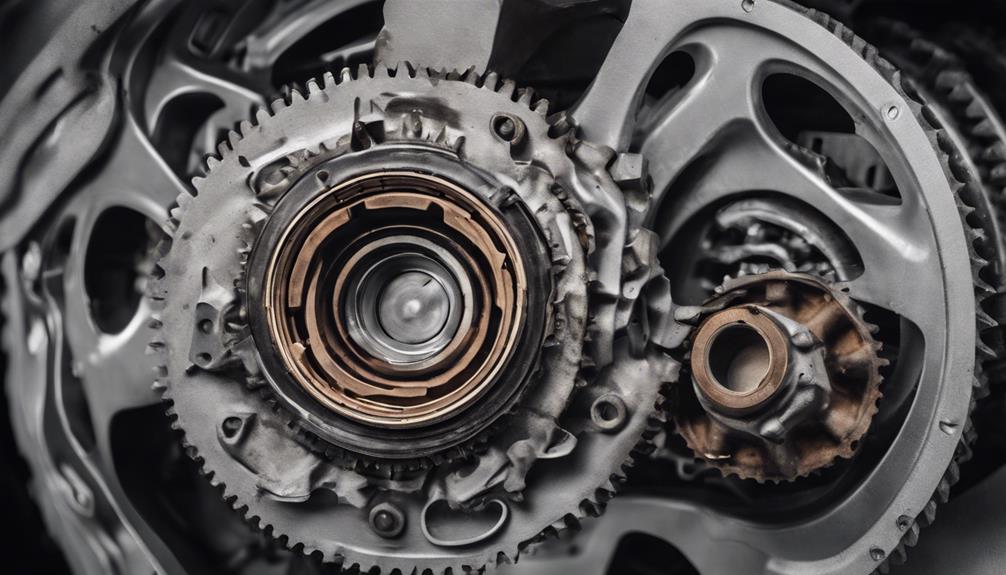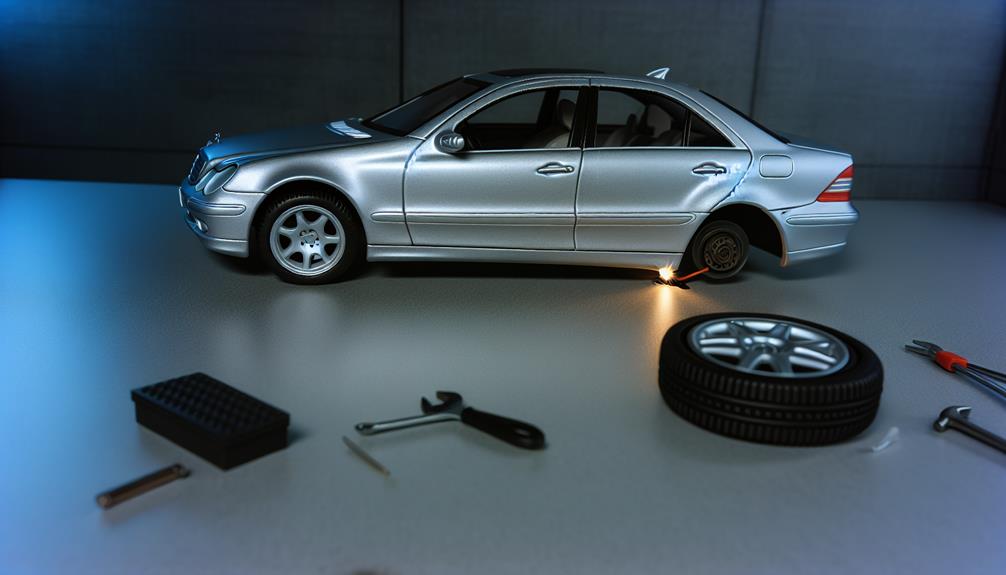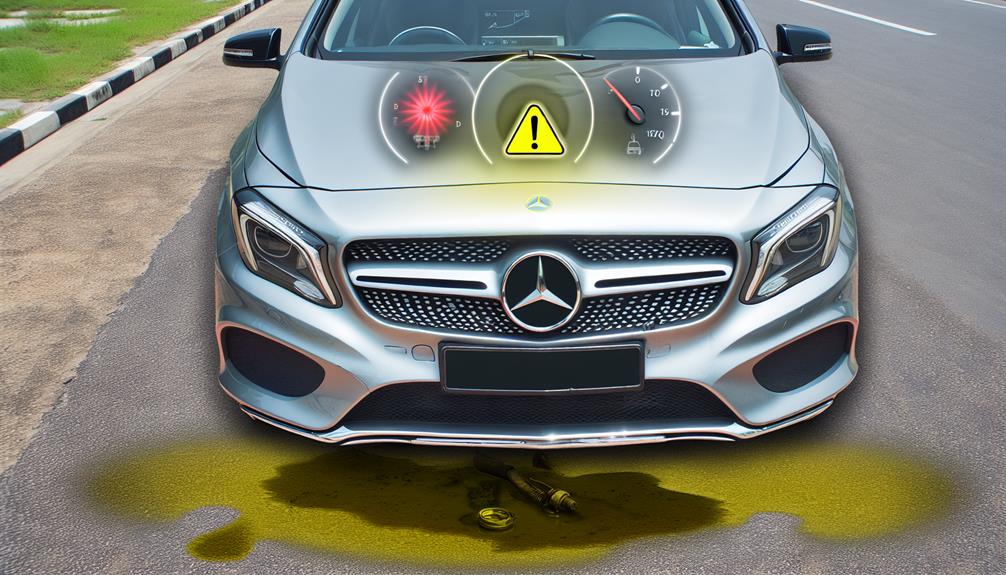If you own a Mercedes C300, watch out for common transmission issues like grinding noises that may signal low fluid levels leading to friction. Chipped gears from wear can also cause these sounds; monitoring fluid levels and regular inspections can prevent this. Leaks from damaged pans or lines can decrease performance, so prompt maintenance is key. Pay attention to components like flex discs to avoid engine misfires.
Stay alert for oil pressure switch malfunctions and opt for OEM parts for replacements. Ensuring regular maintenance and prompt diagnosis can help you address these issues effectively. Understanding these issues is important for keeping your Mercedes C300 running smoothly for years to come.
Key Takeaways
- Transmission grinding noises indicate potential issues like low fluid levels or chipped gears.
- Leaking transmission fluid can result from damaged components or old fluid, impacting performance.
- Regular maintenance of components like flex discs and oil cooler hoses is crucial for peak performance.
- Oil pressure switch problems can lead to rough shifting, emphasizing the need for professional diagnosis.
- Adhering to maintenance schedules, checking fluid levels, and using high-grade fuel can prevent major breakdowns.
Transmission Grinding Noises

If you hear grinding noises coming from your Mercedes C300 transmission while accelerating, it could be a sign of a defective transmission. These grinding noises are often indicative of underlying issues such as low transmission fluid levels. Insufficient fluid can lead to increased friction between internal components, causing grinding sounds during gear shifts. It's important to address this issue promptly to prevent further damage to the transmission system.
When low transmission fluid levels are the culprit behind the grinding noises, topping up the fluid to the recommended level can help alleviate the problem. However, if the grinding noises persist even after refilling the fluid, it's advisable to seek professional assistance. Ignoring these sounds can exacerbate the situation and potentially result in more severe transmission issues down the line.
Regularly monitoring and maintaining the transmission fluid levels in your Mercedes C300 can help prevent grinding noises and ensure smooth operation of the transmission system. By staying proactive and addressing any unusual sounds promptly, you can extend the longevity of your vehicle's transmission.
Low Fluid Levels
Having low fluid levels in your Mercedes C300 can result in serious transmission problems and decreased performance.
It's essential to understand the causes of leaks and regularly check your fluid levels to prevent potential damage to your transmission components.
Neglecting to maintain proper fluid levels can lead to overheating, slipping gears, and costly repairs down the line.
Causes of Leaks
Low fluid levels in the transmission, transfer case, or differential of the Mercedes-Benz C300 4MATIC can lead to leaks, impacting the vehicle's performance and reliability. To understand the causes of leaks related to low fluid levels, consider the following:
- Lack of Maintenance: Neglecting regular checks on transmission fluid levels can result in leaks over time.
- Seal Degradation: Aging seals or gaskets can weaken due to low fluid levels, leading to potential leaks.
- Overheating: Inadequate fluid levels can cause the system to overheat, increasing the likelihood of leaks.
- Driving Habits: Aggressive driving or towing heavy loads with low fluid levels can strain the components, contributing to leaks.
Checking Fluid Levels
To guarantee the peak performance and longevity of your Mercedes C300, regularly checking and maintaining appropriate fluid levels is essential. Low transmission fluid levels can result in transmission slipping and overheating, impacting the smooth operation of your vehicle.
Similarly, insufficient power steering fluid may lead to steering issues and unwanted noises in your Mercedes C300, affecting your driving experience. It's vital to make sure that the transmission fluid, power steering fluid, coolant, and brake fluid levels are within the recommended ranges to prevent potential damage and malfunctions.
Chipped Gears

If you notice grinding noises while shifting gears in your Mercedes C300, chipped gears could be the culprit.
These chips may stem from long-term wear or a lack of proper upkeep on your transmission system.
Promptly addressing this issue is crucial to prevent further harm to your vehicle's transmission.
Gear Wear Issues
Gear wear issues, such as chipped gears, in the Mercedes C300 can lead to high-pitched or grinding noises during acceleration. To address these problems effectively, consider the following:
- Monitor Transmission Fluid Levels: Verify proper transmission fluid levels to prevent excess wear on gears.
- Check for Contaminants: Regularly inspect the transmission for contaminants that may contribute to gear chipping.
- Inspect Differential Fluid: Maintain adequate fluid levels in differentials to safeguard against gear damage.
- Address Synchronizer Failures: Timely replacement of failed synchronizers in manual transmissions can prevent chipped gears.
Performance Impact Analysis
When assessing the performance impact of chipped gears in the Mercedes C300 transmission, it is important to take into consideration the direct correlation between gear wear and driving dynamics. Chipped gears can lead to unusual sounds during acceleration, affecting the overall performance of the vehicle. Checking transmission fluid levels regularly is vital, as low levels or contaminants can contribute to gear damage. Addressing chipped gears promptly is essential to prevent further issues and maintain peak performance. Here is a breakdown of the key factors to take into account:
| Factors | Impact |
|---|---|
| Chipped Gears | Increased noise, reduced efficiency |
| Transmission Fluid | Proper levels essential for gear health |
| Driving Dynamics | Affected by gear wear |
| Gear Replacement | OEM parts necessary for resolution |
Leaking Transmission Fluid
Leaking transmission fluid in a Mercedes-Benz C300 can stem from various issues such as a damaged fluid pan or severed fluid lines. If you notice leaks under your car or experience difficulty going uphill or downhill, it may be time to check your transmission fluid levels. Here are some key points to take into account:
- Fluid Pan or Lines: Examine the fluid pan and lines for any cracks, holes, or loose connections that could be causing the leaks.
- Transmission Fluid Replacement: Struggling performance can indicate old or insufficient fluid. Regularly changing the transmission fluid can prevent leaks and maintain peak performance.
- Torque Converter Issues: Leaks might be a symptom of a faulty torque converter, impacting the hydraulic pump's functionality. Addressing this promptly can prevent further damage.
- Maintenance: Regularly check transmission fluid levels and address any leaks immediately. Timely maintenance can prevent overheating issues and potential transmission failure.
Damaged Components

Addressing damaged components promptly in your Mercedes-Benz C300 is essential to maintaining peak performance and preventing further vehicle issues. Common damaged components in the Mercedes-Benz C300 include the driveshaft flex discs, center driveshaft support bearing, and electronic modules in the 4MATIC system.
Failure to address these components can lead to engine misfires, electrical system malfunctions, and transmission problems. Regular inspections by experienced technicians can help identify these issues early on and prevent costly repairs down the line.
The driveshaft flex discs and center driveshaft support bearing play critical roles in the smooth operation of the vehicle, while the electronic modules are essential for the proper functioning of the 4MATIC system. Neglecting these components not only affects the performance of your Mercedes-Benz C300 but also poses safety risks while driving.
Be proactive in addressing any signs of damage to these components to ensure the longevity and reliability of your vehicle.
Oil Cooler Hose Issues
To guarantee peak performance and prevent system overheating in your Mercedes-Benz C300, monitoring and promptly addressing any issues with the oil cooler hose is essential. The oil cooler hose plays a critical role in regulating oil temperatures for the engine and transmission. Here are some key points to contemplate regarding oil cooler hose problems:
- The oil cooler hose in your Mercedes-Benz C300 connects the radiator to both the engine and transmission, aiding in cooling the lubricating oil.
- Failure to promptly address broken or damaged oil cooler hoses can result in system overheating, potentially causing damage to the engine and transmission.
- Optimal performance is best achieved through the replacement of oil cooler hoses with OEM Mercedes-Benz parts.
- Monitoring oil temperatures regularly and addressing any cooling system issues promptly are crucial steps in preventing overheating problems that could impact your vehicle's performance and longevity.
Oil Pressure Switch Problems

Monitoring the oil pressure switch in your Mercedes-Benz C300 is essential for guaranteeing smooth transmission operation and preventing potential wear and tear issues. The oil pressure switch plays a key role in monitoring hydraulic pressure levels within the transmission system.
When this component malfunctions, it can result in symptoms such as rough shifting or sluggish operation. Continuous pressure irregularities stemming from a faulty oil pressure switch may lead to increased wear and tear on the transmission over time.
To address oil pressure switch problems, it's advisable to seek professional diagnosis and replacement by certified technicians. Regular maintenance and inspection of oil pressure levels are crucial to ensure optimal transmission performance and avoid more significant issues down the road.
Maintenance and Diagnosis Importance
Regular maintenance and timely diagnosis play a critical role in addressing common problems with the Mercedes-Benz C300. To guarantee your vehicle runs smoothly and avoids major issues, consider the following:
- Follow the Maintenance Schedule: Adhering to the manufacturer's maintenance schedule helps prevent major breakdowns and costly repairs.
- Monitor Warning Lights and Fluid Levels: Address warning lights promptly and regularly check fluid levels to maintain peak vehicle performance.
- Drive Cautiously and Use Quality Fuel: Drive carefully to prevent excessive wear and use high-grade fuel to contribute to the longevity of your Mercedes-Benz C300.
- Consult Certified Mercedes-Benz Mechanics: Seek assistance from experienced and certified Mercedes-Benz mechanics for diagnostics and repairs to efficiently resolve maintenance issues.
Frequently Asked Questions
Is the Mercedes C300 Reliable?
The Mercedes C300 has a mixed reliability rating. Electrical system issues, engine misfires, and transmission problems are common. Brake malfunctions and suspension troubles occur. Stay diligent with maintenance, address warning lights promptly, and drive cautiously.
What Are the Disadvantages of Mercedes Benz C300?
Owning a Mercedes-Benz C300 can lead to high repair costs due to common issues like engine repairs, electrical problems, and transmission issues. You might also face complaints about overheating engines, dashboard warning lights, and more.
Is Mercedes C300 Expensive to Maintain?
Maintaining a Mercedes C300 can be pricey. Costs vary based on repairs needed but average between $300 and $5,000. Regular maintenance like oil changes and brake pad replacements can help minimize unexpected expenses.
What Is the Life Expectancy of a Mercedes C300?
With proper maintenance, a Mercedes C300 can last well over 100,000 miles. Regular service like oil changes and brake inspections is essential. Following the manufacturer's schedule and addressing issues promptly can guarantee longevity.
Conclusion
To sum up, typical issues with the Mercedes C300 involve:
- Transmission grinding noises
- Inadequate fluid levels
- Chipped gears
- Transmission fluid leaks
- Compromised components
- Oil cooler hose issues
- Oil pressure switch issues
It's crucial to stay vigilant with maintenance and promptly identify any problems to avoid additional damage and expensive repairs. By tackling these issues early on, you can guarantee the longevity and performance of your Mercedes C300.









